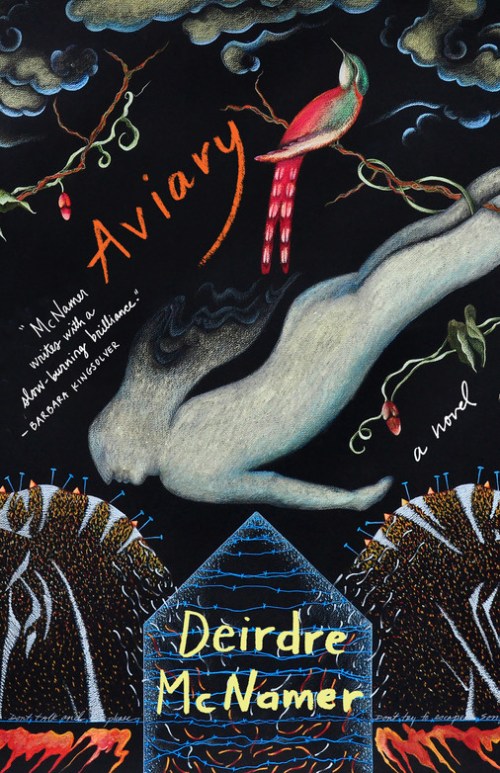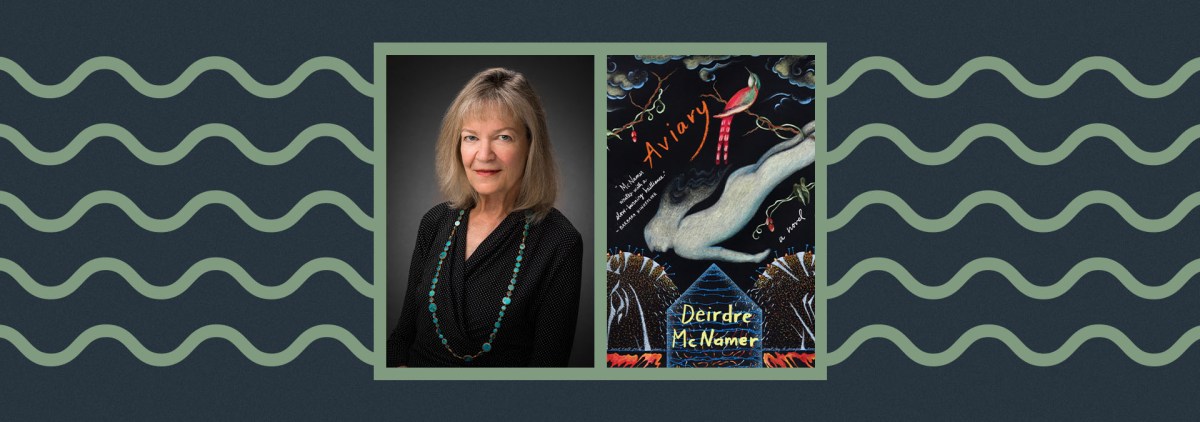[ad_1]
Montana is often called “Big Sky Country,” but you wouldn’t necessarily know it from the people inhabiting Deirdre McNamer’s Aviary. Set in an elderly housing facility called Pheasant Run, the novel is a tender and evocative portrait of life in its late stages, when confinement might be physical but the memory can still roam free. McNamer effortlessly weaves in elements of mystery and comedy as she introduces readers to a memorable cast of characters, including Leo Umberti, who enjoys painting still lifes and harbors a devastating secret; the untethered Cassie McMackin, who lost her husband and daughter within months of each other; and her best friend Viola Six, who’s either losing her mind or more right about things than anyone can believe. Into this cloistered world comes fire inspector Lander Maki, who begins to suspect a recent incident in Pheasant Run is a work of arson. A literary thriller written with McNamer’s trademark emotional acuity, Aviary is as questioning as its characters, heart-haunted, buoyant, and rich with the wonders that make life worth living. I had the pleasure of speaking with McNamer by phone about how Aviary came together, a conversation as rewarding and expansive as the book itself.

Sara Batkie
I’d love to know what the first seed of this book was for you, whether it was a character, an image, a bit of dialogue, or something else?
Deirdre McNamer
In my case, I’m a really inefficient writer in some ways. I sort of proceed by following my nose and it can take a long time. So basically, after my last book Red Rover was published, I worked on another novel entirely. There were some elements in it that showed up later in Aviary, you know, a medically over-drugged teenager and a woman with telepathic tendencies. There were markers of my interests, but the project just didn’t catch me up in enough of a way for me to keep engaging with it. And that’s always unpleasant to discover! But right about that time my parents were really beginning to struggle with old age and decline. They lived in an apartment-condo combination just six blocks from my house in Missoula and I was there almost every day for several years. Their increasing fragility, combined with the increasing fragility of the building really set me on this new path, I would say. The building was declining because of the aftereffects of the 2008 recession, declining property values then, new restrictions on loans for condo purchases, deferred maintenance; there really was a wonky elevator like the one in Aviary. The actual building was in much better shape than the one in the book, but it got me thinking about how fraught it can be to imagine the worst when your surroundings are such that you’re very vulnerable. So that started my kind of “what if’s.” What if a fire broke out? What if there was a scheme to empty the building? Who would be the bully or enforcer? What if it was the manager? So that’s all fiction, but it got me starting to imagine characters who might be in that situation. My problem for awhile, though, was that I was trying to protect myself from my own sense of being disconcerted and grieved about my father’s dementia, my mother’s very wonky heart, all of this stuff, so the way that I was writing it was self-protective. I made it kind of antic and comic, the characters were too one-dimensional, I was playing it too broadly, just to shield myself from the actual situation. So ultimately I realized I was on the wrong course and so I spent several more years basically trying to make the tone of it coherent. It was veering around and wasn’t sounding right to my ear. It took me a long time to get the balance right so I wasn’t making my characters too sweet, too colorful. So finally when it came together in that way I was able to sell it and bring it into the world.
Sara Batkie
The opening chapters really take their time building a sense of place, both in the descriptions of the Pheasant Run facility and of Montana, which is also where you make your home. Were there any unexpected revelations or challenges about writing a place you know so well?
Deirdre McNamer
Well, interestingly or not, all of my novels have been set mostly in Montana, where I grew up and spent the great bulk of my adult life. But Montana is really a various sort of place. I’ve always known that. I grew up in the far northern rural prairie part of the state where the wind blows you over and there are no trees. The eye travels a long while before it reaches any horizon. It’s harsh, grand, scarcely-populated countryside. I’ve lived most of my adult life here in Missoula, and that’s a sheltered mountain valley, a college town, a river runs through it, the very river that the University of Chicago’s Norman Maclean memorialized. So that’s a very different Montana, and I like the fact that I’ve never fully been able to sum up this state. I’ve chosen to investigate its parts, but I couldn’t tell you finally, really what it is and what the power of the place is for me except that it does exist. Aviary is set in that second version, the college town that’s really amiable-seeming, although of course it has its troubles and sorrows like anywhere else. But it’s a kind of easy, pleasant place to live. It’s also full of young people who come here for the college and outdoor life, and it struck me when I observed my parents and their contemporaries living right in the middle of that, two blocks from the university, with everybody around them freer than they were physically, or seemed so. So they are in a kind of aviary where they’re enclosed and don’t have the physical or mental capacities that they had for a large part of their life. I thought it could be anguishing to be shut up that way. Not locked down but just removed from everyone around you seeming more vital than you are. In that way I was glad that I had a chance to bring a little city into a story about people who for the most part aren’t able to partake in its best attributes.
Also, with Montana, there are so few people in the entire state. It’s the fourth largest state in the country with a population the size of Phoenix; there are 93 people per square mile in the entire United States and there are six per square mile in Montana. So coincidental-seeming intersections aren’t infrequent here. You run up against people you’ve met before unexpectedly, especially if you’ve been here for decades. So, for example, in the case of my father, he let me look at a collection of his diaries from World War II and one time when he was on leave from the Air Force, he came back to Missoula where he’d been going to school and wrote down that he was “giving the rush” to a young woman at that time who had a very distinctive name. Low and behold, at some point in my visits to the building where my parents were living, I found out that this woman was living in the very same building, one floor over theirs. My father’s memory had really ebbed. He never knew who she was; I’m not sure she knew he was in the building. They were both around 90 years old. So they probably got on the elevator together and never realized it. I was the one to put it together. When that kind of thing happens you almost can’t use it in fiction because it seems too coincidental to be true, but that is one aspect of Montana, those serendipitous coincidences, that I find I can make use of from time to time.
Sara Batkie
The depiction of old age here feels really special, and rare in fiction. There’s room made for the joy and sensuality of your elderly characters along with pain and grief. Why was it important to you to write about people at this stage of life?
Deirdre McNamer
I’m glad to hear that came through, because I really believe that’s the case for a lot of elders. But writing about old age has been important to me since I was quite young. One reason I think is because it seems like just an inherently dramatic time of life, although everybody will tell you that old people aren’t interesting, nothing big is going to happen to them. But I think it’s dramatic in a way that’s rivaled only by late teenage or early-20’s years when every choice is fraught: dating this person, living in this place, taking that job and not another, coming to terms with your most authentic self or not doing that, are all determinants of the very course of your life when you’re quite young. And in old age, when you’re near the very end, all of those choices jump up again with a new kind of power and the power now is that certain choices are unalterable. They happened—you made them happen in part, or they happened to you. Old age is a time of quiet reckoning with your choices and what you still don’t understand about human life, especially now that there isn’t much of it left. You’re on a kind of cliff. And what is possible for you in the time left? So to stay relatively calm and graceful and curious under those circumstances seems nothing less than heroic to me, in many cases, especially when you throw in that there’s almost inevitably physical or mental fragility on top of this sense of time sweeping away. And maybe a factor in my case is that when I was twenty-six, a doctor looked at a full body X-ray of my skeleton and pronounced a bit too buoyantly that I had the bones of an eighty year old. This turned out to be a very anomalous form of arthritis that has been addressed over the decades successfully via multiple joint replacements, but I lived with this knowledge very early on that I was kind of essentially older physically than anyone my age. Now that I’m actually verging on that state, a lot of people my age have caught up with me on the joint level. But it’s been a strange journey and maybe because I’ve known what it’s like to feel physically limited at times is where some of my interest in the elderly comes from.
Sara Batkie
As a reader, I got such a thrill out of following along with Maki as he conducted his job as a fire inspector. The way he engages with smell and his environment was so vividly realized. Did you do a lot of research to inform those sections? How do you feel about research generally when it comes to writing projects?
Deirdre McNamer
I’m lucky enough to have a friend who’s retired from the fire department in Missoula. He was a fire inspector/marshal so I had a big long interview with him about the ways, once I’d started the book and knew it was going to involve an arson, something like this could happen: ways a fire can be set to make it look like an accident, how some fires are set by people who then reappear on the scene to put it out and make themselves heroes, and how difficult arson is to prove because you have to disprove every other plausible cause. You have an absence, a scene of destruction that you have to put together what might have happened and rule out everything besides a crime. But I also read these websites that are about improving fire-investigation techniques. I learned about an arson method that involves a balloon filled with fuel and you set it swinging over a candle until it stops and the fire bursts out but the perpetrator is far away by then. I found an actual quote that stuck with me from an arson investigator who said, “the problem is you’re looking at something that’s destroyed and you have to be able to put it back together again either in your mind or physically to determine the origin and cause.” So imagination is involved in the whole process. It has very obvious ties with things like memory and loss, what disappeared, how do you retrieve it. So it just stayed interesting to me, that there are aspects to this kind of crime that resonated in a literary way.
I was a daily reporter for a decade before I ever wrote any fiction, so I believe in research and having your facts as right as you can make them. So I have big fat files with labels on them, things like “Video Games” or “Cyber Security,” “Shamanism,” “The Drug Industry,” “The Fort Missoula Internment Camp.” And then there’s just little clippings in them. Our local newspaper runs this wonderful little column called Earth Week that has these little known facts about anomalous things in nature so I have a lot of those odd types of items. I did a fair amount of research but when you’re writing fiction you do it in a different way than when you’re writing journalism or history. You’re looking in your research as a fiction writer for those details that you can use to make a reader feel that they are there or involved with your character. I’m not going to write an essay about Big Pharma but I’m going to use information about what particular drugs do to teenagers for medical reasons to create a character involved in that. So it’s an act of transferring information from the realm of pure fact into the realm of a reader’s ability to experience something.
Sara Batkie
This book is in some senses a mystery, even as it also confounds our expectations of that genre. How much was this aspect of the book planned and how much was discovery? Are you an outliner or do you like to work through plot as you go along?
Deirdre McNamer
I’ll start with the second question first: I’m a sporadic outliner. It makes me so anxious to write fiction just generally. I don’t know what I’m doing, I don’t know where I am. So in my case it’s a long period of not knowing a lot of things that I’m going to have to try and render eventually. I’ll make what I call a provisional outline and I try to follow it for a while and if it doesn’t seem to be leading me to where I want to go, I’ll move into a freer mode and work more instinctively, just get 500 or 1,000 words down a day and see what they yield. And then that makes me anxious all over again, that I have to make another outline based on that. I go back and forth between these methods and it’s basically reaching some level of frustration with one that makes me pop back to the other. That’s my messy way of working. But I also want to be able to surprise myself, and I’ve done it in fiction before. I’ve reached points where I see what I’ve written and say “oh, now I can see what’s going on.”
I intended early on to write a kind of classic mystery story. Most classic mysteries, I think, offer a sense of order and even comfort. A crime has been committed and the book gradually hones in on who the perpetrator was. Often the person seeking the solution has a past that is evoked by the criminal investigation. There’s a resolution of both the crime and, to some extent, the investigator’s personal difficulties. That’s how a lot of them go. It’s a genre that moves towards closure. Life’s real mysteries tend to be much less manageable. The mystery of memory and its fragile relationship to reality, in some cases. The mysteries of yearning, self-sacrifice, of cruelty for its own sake. The mystery of runaway greed, the mystery of innocent children suffering, the mystery of joy, of laughter. Those mysteries started to seem more interesting to me than who set a fire and why. Writing the book then turned out to be me in a wrestling match with the mysteries that were more interesting to me, but way more unsolvable. I just found I could stay with those more than the whodunnit. It made me move out to the edges of the plot and focus on characterization and these people’s pasts, where they thought they were in their lives, what had been done and what might happen. All of those are psychological situations, and I was just more interested in that. It kept me writing much longer than I initially planned. I didn’t set out to undermine the original plan but I ended up doing that just by pursuing my instincts.
Sara Batkie
The book’s closing scene is set on a specific date in February 2020, and it’s hard not to come away from it thinking about all that might await these characters in the year to come. Did you always know you would end the book there? Were there any characters whose fates surprised you?
Deirdre McNamer
Well, I had the book done way before February 2020. And that last section used to be called “We Fly Away.” But earlier in the book, there’s a character Rhonda who has sort of gifts of perception with animals telling her husband Maki that something is wrong, something is off, the animals are upset but don’t know why. She senses that something huge is on the move. In terms of the time of the book, she was saying this about a year and a half before February 2020, and that just felt kind of spooky to me when I re-read it. I wrote a prophecy without knowing it! When I was doing my last tweaks in June 2020, I just thought “I don’t want to write about the pandemic,” but I did change the section title because I knew it would install the idea that these characters aren’t just on the cliff-edge of their own mortality but the edge of this scourge that’s so cruelly targeted the old. So it’s just a hint that all of us are closer to really extreme change at any point in our lives than we might think.
Sara Batkie
Could you talk a bit about what the publishing process was like for you with this book? When did you know you’d found the right home for it?
Deirdre McNamer
It took me a very long time to actually finish this book, for one reason or another. My previous book came out in 2007, so thirteen years between then and the publication of this. On and off I was working on other things, I was dealing with my parents, dealing with full-time work. But one effect of it all was that I was away from publishing for long enough that I think it made a number of publishers a bit wary. Who is she? What’s she doing now? Also with an early version of it that went around, I still hadn’t worked out the tone of it. I have a wonderful agent who kept believing and kept getting it out there. You know, I’m seventy years old and at that age you become someone who is not a big catch for corporate publishing. I don’t have a predictable trajectory, I don’t have a brand, all of my books have been very different from each other and quite widely spaced. So when it got to Milkweed and Daniel Slager there just really welcomed it and saw it, and also saw what the problems still were. There were still elements to work out and add and he saw exactly what needed to be done, and lucky for me it wasn’t a daunting task. It turned out to be one of the best publishing experiences that I’ve ever had in a career that began in the late 80’s. So because it’s a non-profit and the people there seem very invested in individual voices and work that explores borders of one kind or another, it was just very fortunate that they were interested and I got exactly the editorial advice that I needed so the book could become a real thing in the world.
Sara Batkie
What’s next for you? Any virtual events that our readers can attend?
Deirdre McNamer
You can go to either Milkweed or my website under Events. We’ve put together a virtual tour that I’m really excited about. I’ll be having conversations with writers under the auspices of various independent bookstores around the country. I’m really looking forward to it. It sounds like so much more fun than getting up and reading for twenty minutes then walking away! I’ve got several other projects underway, one involving an underground missile site I was able to go into right before 9/11, and meet people and see what it was like. I’ve had conversations with a couple people about it over the years and I’ve always been interested in that subject. There’s 150 underground nuclear missiles in north-central Montana ready to go at any minute, and I grew up with it, so I’m writing a novel that’s based on that. I’m also trying to finish off a story collection. So it will be really nice to turn to something else, especially as the world gets more recognizable again.

FICTION
Aviary
By Deirdre McNamer
Milkweed Editions
Published April 13, 2021

[ad_2]
Source link
